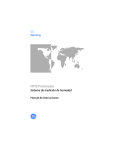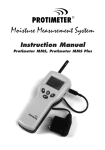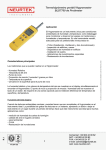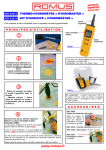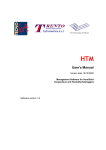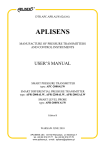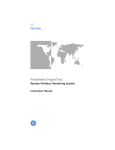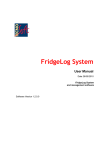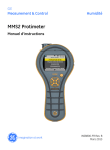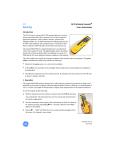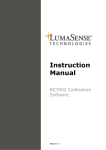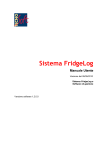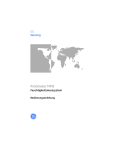Download Protimeter MMS Moisture Meter Manual - Enviro
Transcript
GE Sensing Protimeter MMS Moisture Measurement System Instruction Manual GE Sensing Protimeter MMS Moisture Measurement System Instruction Manual INS5800A October 2005 Table of Contents Introduction. . . . . . . . . . . . . . . . . . . . . . . . . . . . . . . . . . . . . . . . . . . . . . . . . . . . . . . . . . . . . . 1 1. Product Features . . . . . . . . . . . . . . . . . . . . . . . . . . . . . . . . . . . . . . . . . . . . . . . . . . . . 1 1.1 Switching the MMS ON and OFF . . . . . . . . . . . . . . . . . . . . . . . . . . . . . . . . . . 4 1.2 Optional Accessories. . . . . . . . . . . . . . . . . . . . . . . . . . . . . . . . . . . . . . . . . . . . . 4 2. Moisture Meter Modes . . . . . . . . . . . . . . . . . . . . . . . . . . . . . . . . . . . . . . . . . . . . . . . 4 2.1 Search Mode - Selection and Use . . . . . . . . . . . . . . . . . . . . . . . . . . . . . . . . . 5 2.2 Measure Mode - Selection and Use . . . . . . . . . . . . . . . . . . . . . . . . . . . . . . . 7 2.3 Hygrometer Mode - Selection and Use . . . . . . . . . . . . . . . . . . . . . . . . . . . . 8 2.4 Condensator Mode - Selection and Use . . . . . . . . . . . . . . . . . . . . . . . . . . . 9 2.5 Setup Mode - Selection and Use . . . . . . . . . . . . . . . . . . . . . . . . . . . . . . . . . 11 2.6 Holding and Measurement Storage Mode - Selection and Use . . . . 13 3. Diagnostic Procedure Guidelines . . . . . . . . . . . . . . . . . . . . . . . . . . . . . . . . . . . . 14 4. Calibration Checking . . . . . . . . . . . . . . . . . . . . . . . . . . . . . . . . . . . . . . . . . . . . . . . . 16 5. Care and Maintenance. . . . . . . . . . . . . . . . . . . . . . . . . . . . . . . . . . . . . . . . . . . . . . 16 6. Technical Specifications. . . . . . . . . . . . . . . . . . . . . . . . . . . . . . . . . . . . . . . . . . . . . 17 7. Displaying the MMS Information . . . . . . . . . . . . . . . . . . . . . . . . . . . . . . . . . . . . . 18 A1. Using the Protimeter MMS to Measure Moisture in Floors . . . . . . . . . . . . . 18 A1.1 Rapid Moisture Level Assessment of Solid Floors . . . . . . . . . . . . . . . . 18 A1.2 Equilibrium Relative Humidity Measurements in Solid Floors. . . . . 19 i Introduction The Protimeter Moisture Measurement System (Protimeter MMS), is a powerful and versatile instrument for measuring and diagnosing dampness in buildings and building materials. This product enables building surveyors and other practitioners to measure moisture levels of building elements such as walls, floors and building environments simply by switching between the three different modes of operation. In this way, a detailed understanding of the moisture condition of the property can be obtained. 1 Product Features The Protimeter MMS kit comprises a carry case containing the MMS instrument and a range of standard accessories, as detailed in Table 1 below. As an example, the figure on the next page shows a BLD5800 kit. Table 1: Protimeter MMS Kit Description Standard Kit Kit with Hygrostick/Data cable/software Kit with Humistick/Data cable/software Part Number BLD5800 BLD5800LH BLD5800HS Kit Components Protimeter MMS instrument POL5800JC Instruction manual INS5800 Carry case POU5800-01 Moisture probe BLD5060 Deep Wall Probes (5.5 in. (140 mm) long) BLD5018 Surface temperature sensor (direct contact) BLD5804 Calibration check device (for %WME) BLD5086 Hygrostick/Humistick extension lead BLD5802 Hygrostick hygrometer probe POL4750 Humistick moisture probe POL7750-2 Data cable and software (option) BLD5810 Protimeter MMS Moisture Measurement System Page 1 POU5800-01 POL5800 BLD5802 BLD5804 BLD5060 BLD5018 POL4750 BLD5800 Kit The Protimeter MMS instrument is a battery-powered, handheld unit that has a cluster of four buttons and a large liquid crystal display (LCD). A sensor for detecting moisture within solid materials is housed in the bulge at the top of the instrument. The following external connections are found on the instrument case (see the figure on the next page): • EC 1 - This edge connection socket is for use with a Hygrostick or Humistick probe. • JC - This jack connection socket is for use with a moisture probe, deep wall probes or a hammer electrode. • EC 2 - This edge connection socket is for use with the Direct Contact Surface Temperature Sensor and for connection to a PC when using the optional MMS logging software. Page 2 Protimeter MMS Moisture Measurement System EC 1 EC 2 JC Search Mode Sensor The following probes and sensors are included in the standard Protimeter MMS kits: • The Hygrostick® (POL4750) and Humistick® (POL7750-2) probes measure relative humidity (%RH) and ambient air temperature (TAIR) in rooms or materials. They can be connected to the Protimeter MMS instrument either directly or by means of the Hygrostick/Humistick extension lead. • The surface temperature sensor (TS) is used when investigating condensation situations. • The moisture probe is used to obtain percent moisture content values in wood or wood moisture equivalent (WME) values in other non-conductive materials. • Deep wall probes are used to obtain WME values deep below the surface in solid structures such as walls and floors. Protimeter MMS Moisture Measurement System Page 3 1.1 Switching the MMS ON and OFF Prior to initial use, ensure that two AA batteries are correctly inserted in the battery compartment. ! Note: Low battery power is indicated by on the display; when this symbol appears, replace the batteries. Switch the MMS ON by pressing momentarily. The MMS switches OFF automatically after 1 minute, unless the default setup is changed (see section 2.5 for instructions). To switch the instrument OFF immediately, press and hold for at least 3 seconds. Once has been depressed for 3 seconds or more, all text blocks appear on the display; when is released, the text blocks disappear and the unit switches OFF. 1.2 Optional Accessories A range of optional accessories may be used with the Protimeter MMS. These include: • hammer electrodes • data download software & cable • additional Hygrosticks and Humisticks For more information please contact GE Sensing. 2 Moisture Meter Modes The Protimeter MMS can be used to detect and measure moisture in nonconductive solid materials such as wood, drywall and masonry. Two modes of operation are available, the Search Mode for qualitative measurements and the Measure Mode for precise and localized moisture content measurements in wood or WME values in materials other than wood. Page 4 Protimeter MMS Moisture Measurement System 2.1 Search Mode - Selection and Use Turn the MMS ON by pressing . Select the moisture meter mode by pressing XX repeatedly until the word MOISTURE is visible in the top right corner of the LCD. Then press X to select the Search mode, indicated by REL ) ))) on the LCD. The instrument can now be used to take relative moisture readings in solid, homogenous materials (such as walls and floors) by holding the leading edge of the sensor bulge against the surface (see the figure below) at an angle ranging from 20° to 50°. Relative readings ranging from 0-1000 appear on the LCD together with a progress bar that indicates whether the material is in a DRY, AT RISK or WET condition. As reliable readings are obtained only if the leading edge of the sensor bulge is in direct contact with the surface, the Search mode is not suitable for surveying textured finishes. The nominal depth of penetration is up to 0.6 in. (15 mm) in dense, homogeneous materials. Readings taken through lowdensity coverings (carpets, polystyrene tiles, etc.) will not be representative of the moisture level in the substrate itself. When using the MMS in Search mode, it is recommended that no attachments (i.e. Hygrostick probe, Humistick probe, Surface Temperature Sensor, or Moisture probe) are connected. This practice will minimize reading errors and the potential for electromagnetic interference with other electronic equipment. 2.1.1 Search Mode - Zeroing Function If that instrument is used in Search Mode at an ambient temperature that is significantly different from the ambient temperature at the time of the original calibration, the instrument may show a small, non-zero reading when held in free air. Protimeter MMS Moisture Measurement System Page 5 If this should occur, re-zero the instrument as follows: 1. Remove any attached accessories and select Moisture Search Mode (see section 2.1 for instructions). MOISTURE & REL is displayed. 2. With one hand, hold the instrument at least 12 in. (0.3 m) from all objects (see the figure to the right). 3. With your other hand, simultaneously press the XXand X buttons. Hold them down until the display shows nul, then Air. Quickly release the buttons and continue to hold the instrument as shown, well clear of your body and your other hand. Keep the instrument in free air (i.e. at least 12 in. (0.3 m) from all objects) while the display is showing Air. 4. After about 10 seconds, the display should return to normal and the instrument should read zero when held in free air. You may now take normal Search Mode readings with the MMS. 2.1.1.1 Troubleshooting the Zeroing Function - The instrument changes mode when zeroing Is attempted If the instrument changes mode when you attempt to zero it, you have most likely not pressed the two buttons at exactly the same time. Return to Search Mode and attempt to press and hold the two buttons simultaneously. 2.1.1.2 Troubleshooting the Zeroing Function - The instrument shows Air, but then displays Err or E30 and shuts OFF If this situation occurs, repeat the zeroing procedure. If this does not solve the problem, it is likely that the temperature adjustment is outside the permitted range. If possible, allow the unit to return to normal room temperature (about 20°C/68°F). If the unit will not re-zero at this temperature, the unit is likely faulty and requires repair/service. Page 6 Protimeter MMS Moisture Measurement System 2.2 Measure Mode - Selection and Use Turn the MMS ON by pressing . Select the moisture meter mode by pressing XX repeatedly until the word MOISTURE is visible in the top right corner of the LCD. Then press X to select the Measure mode, indicated by %WME on the LCD. Connect the Moisture Probe, Deep Wall Probe, or Hammer Electrode into socket JC of the MMS instrument. The instrument can now be used to take actual %MC readings in wood and %WME readings in non-conductive solid materials other than wood by pushing the moisture probe pins into the surface (see the figure to the right). The measured value is displayed and the progress bar indicates whether the material is in a DRY, AT RISK or WET condition, as listed in Table 2 below. Table 2: Measure Mode Readings %MC (wood only) or %WME MMS Measure Mode Display <8% – – – % (denotes out of range), [inactive progress bar] ≥8% but <17% %MC or %WME value, DRY, [active progress bar] ≥17% but <20% %MC or %WME value, AT RISK, [active progress bar] ≥20% but <28% %MC or %WME value, WET, [active progress bar] ≥28% to 100% Relative value only, [active progress bar] Protimeter MMS Moisture Measurement System Page 7 2.2.1 Using Auxiliary Moisture Probes in Measure Mode To take sub-surface readings in masonry, the Deep Wall Probes should be used instead of the standard Moisture Probe. To use the deep wall probes, drill two 1/4” (6 mm) diameter clearance holes, spaced 2-3 in. (50-75 mm) apart, to the required depth (see figure at right). Push the two Deep Wall Probes into the holes and press and hold the tips firmly against the bottom of the holes. Ensure that the probes are connected to socket JC and measure the %WME value as described in section 2.2. Note: The most convenient way to take sub-surface readings in wood is by using an optional Hammer Electrode. 2.2.2 Detecting Hygroscopic Salts The Protimeter MMS instrument can be used as a basic salts detector when used with the Moisture Probe, filter papers and distilled water (not included). Moisten the filter paper with the water and take a reference reading across it with the Moisture Probe. Then place the moistened filter paper against the surface of interest and hold in place for 30 seconds. Remove the paper and place the pins of the Moisture Probe across the paper again and observe the reading. Compare this reading with the original reference reading. If the difference is more than 20 points, there is significant salts contamination that may warrant further investigation. 2.3 Hygrometer Mode - Selection and Use To use the Protimeter MMS as a hygrometer, connect the Hygrostick or Humistick probe into socket EC1 either directly or indirectly with the extension lead. Turn the MMS ON by pressing . Then, select the hygrometer mode by pressing XX repeatedly until the word HYGROMETER is visible in the top left corner of the LCD. Then press X to select relative humidity (%rh), ambient temperature (TAIR), dew point temperature (TDEW), or specific humidity (g.Lb or AbS) as required. Temperature values can be displayed in °C or °F (see section 2.5 for instructions). Page 8 Protimeter MMS Moisture Measurement System Note: The Mixing Ratio (AbS) or Specific Humidity (g.Lb) displays are preceded by a momentary beep to draw attention to the unit of measure prior to displaying the value. %rh and TAIR measurements are made with the Hygrostick or Humistick sensor, and the MMS instrument uses these values to calculate TDEW. When using the MMS to measure the conditions in air, the humidity probe is normally connected directly to the instrument. However, when it is impractical or awkward to use the instrument in this way, the extension lead may be used to connect the Hygrostick or Humistick to the instrument. Typically, the extension lead will be used when taking readings from probes that have been embedded in structures such as walls and floors. 2.4 Condensator Mode - Selection and Use The Condensator Mode enables the user to assess the risk of condensation occurring on surfaces or to confirm whether or not condensation is present on a surface. To use the MMS as a Condensator, connect a Hygrostick probe directly into socket EC1 and connect the surface temperature sensor into socket EC2. Turn the MMS ON by pressing . Select the condensator mode by pressing XX repeatedly until the word CONDENSATOR is visible at the top of the LCD. Then press X to select relative humidity (%rh), ambient temperature (TAIR), dew point temperature (TDEW), surface temperature (TS) or temperature difference (TDIFF) as required. TS and TDIFF measurements can only be obtained if a Protimeter MMS Moisture Measurement System Page 9 Surface Temperature Sensor is connected to the instrument and held against the surface of interest. Temperature values can be displayed in °C or °F (see section 2.5 for instructions). TDIFF is a useful function when investigating condensation, as it tells the user how many degrees a surface is above or below the prevailing dew point temperature. When a surface exceeds the dew point by more than 3°C, TDIFF is displayed with the message NO CONDENSATION. When a surface exceeds the dew point by 3°C or less, TDIFF is displayed with the message AT RISK, NO CONDENSATION. When the surface temperature is equal to or lower than the dew point, a negative TDIFF is displayed with the message CONDENSATION. The progress bar is activated when TDIFF is less than 14°C above the dew point. The indicator moves from left to right to signify the increasing risk and degree of condensation. Table 3 below summarizes this functionality. Table 3: Condensator Mode Readings Temperature of Surface MMS Condensator Mode Display >14°C above dew point TDIFF, NO CONDENSTATION, [inactive progress bar] ≤14°C but >3°C above dew point TDIFF, NO CONDENSTATION, [active progress bar] ≤3°C above dew point TDIFF, AT RISK, NO CONDENSTATION, [active progress bar] ≤ dew point TDIFF, CONDENSTATION, [active progress bar] Page 10 Protimeter MMS Moisture Measurement System 2.4.1 Sensor Installation All humidity probes must be plugged into socket EC1 in the top (“nose”) of the instrument. This includes: • POL4750 • POL7750-2 Humistick (1-100% RH) Hygrostick (30-100% RH) The only accessories that should be plugged into socket EC2 on the side of the instrument are: • • BLD5804 Surface Temperature Probe MMS-to-PC Data Logging Cable Note: With older instruments, the Low RH Sensor (0-40% RH) BLD5812 was plugged into socket EC2 on the side of the instrument. 2.5 Setup Mode - Selection and Use The Protimeter MMS instrument has a range of features that can be selected by the user (see Table 4 on the next page). To enter the Setup Mode, switch the instrument ON and disconnect any attachments that may be connected. When the display shows three horizontal dashes ( - - - ), press momentarily; the word SETUP then appears in the bottom left corner of the LCD together with the code S 1 in the middle of the display. Within three seconds, press XX repeatedly to scroll through the setup codes as detailed in Table 4 on the next page. Press X to set the desired setup option. Protimeter MMS Moisture Measurement System Page 11 Setup Code S1 S2 S3 S4 S5 S6 DEF 0.00 T1 Table 4: Setup Options Setup Selection Displays temperature values in °C Displays temperature values in °F Activates LCD backlight Deactivates LCD backlight Activates beeper Deactivates beeper Default settings (°C, activated backlight, activated beeper, 1 min. auto switch off) Real-time clock (adjustable only through IrdA comm port with Protimeter software) Auto switch off adjustment, from 1-6 minutes Example 1: To deactivate the backlight and change the temperature readings from °C to °F: • • • • • Enter Setup Mode by pressing • Press momentarily (or wait for three seconds) to return to Operating Mode. momentarily. When the display shows - - - , scroll to S 4 by pressing XX. Press X to select the deactivated backlight option. Scroll to S 2 by pressing XX. Press X to select the °F display option. The instrument now displays temperatures in °F with no backlighting. Example 2: To change the auto switch off time from the default 1 minute to 5 minutes: • • • Enter Setup Mode by pressing • Press momentarily (or wait for three seconds) to return to Operating Mode. momentarily. When the display shows - - - , scroll to T 1 by pressing XX. Press X four times to display T 5. The instrument now switches OFF automatically after 5 minutes. Page 12 Protimeter MMS Moisture Measurement System 2.6 Holding and Measurement Storage Mode Selection and Use Moisture, temperature and RH readings can be held by pressing and holding . If the button is held down for less than three seconds, the instrument reverts to the previously selected mode of measurement. If the button is held down for more than three seconds, the instrument switches off when the button is released (see section 1.1). Readings can be stored in the MMS memory (minimum of 300 line entries) by pressing . Table 5 below details the information that is stored when using this function in the various modes. Contents of the memory can be downloaded to a PC running Microsoft® Windows 95 or later, and can be uploaded to the MMS with the Protimeter MMS Logging Software. Note: For further information see the MMS Logging Help document (INS5800L) supplied with the Protimeter Logging Software CD. Mode MOISTURE Meter Table 5: Logging Information Display Information Logged REL %WME HYGROMETER CONDENSATOR )) yr/mm/dd, hr:min, relative value )) (e.g. 00/01/07, 09:30, 530) yr/mm/dd, hr:min, %WME value (e.g. 00/01/07, 09:30, 12.5) %rh yr/mm/dd, hr:min, %rh, TAIR, Hygrostick SN (e.g. 00/01/07, 09:30, 52.5, 21.2, 123456) TAIR yr/mm/dd, hr:min, TAIR, Hygrostick SN (e.g. 00/01/07, 09:30, 21.2, 123456) TDEW yr/mm/dd, hr:min, TAIR, TDEW, Hygrostick SN (e.g. 00/01/07, 09:30, 21.2, 10.5, 123456) %rh yr/mm/dd, hr:min, %rh, TAIR, Hygrostick SN (e.g. 00/01/07, 09:30, 52.5, 21.2, 123456) TAIR yr/mm/dd, hr:min, TAIR, Hygrostick SN (e.g. 00/01/07, 09:30, 21.2, 123456) TDEW yr/mm/dd, hr:min, TAIR, TDEW, Hygrostick SN (e.g. 00/01/07, 09:30, 21.2, 10.5, 123456) TS TDIFF yr/mm/dd, hr:min, TS (e.g. 00/01/07, 09:30, 18.6) yr/mm/dd, hr:min, TDIFF, TAIR, TDEW, Hygrostick SN (e.g. 00/01/07, 09:30, 8.1, 21.2, 10.5, 123456) Protimeter MMS Moisture Measurement System Page 13 3 Diagnostic Procedure Guidelines When diagnosing dampness in buildings, there are three key criteria that must be considered. These are outlined in Table 6 below. Item Table 6: Diagnostic Criteria Criteria Notes 1 Is a wall or other building element in a safe air-dry condition? Air-dry is the moisture content that is normal and safe (from moisture-related deterioration or decay) in buildings. When the Protimeter MMS moisture meter modes are selected, measured values are identified as DRY, AT RISK or WET. 2 Is the surface temperature of a Dew point is the temperature at which a wall or other building element given quantity of air becomes saturated above or below the dew point? (100% RH) and forms dew, or condensation. If a surface is colder than the dew point, condensation occurs. When the Protimeter MMS Condensator Mode is selected to measure TDIFF (the proximity of a surface to the dew point) the instrument identifies either a NO CONDENSATION condition, an AT RISK condition, or a CONDENSATION occurring condition. 3 Is a wall surface or other building element contaminated with hygroscopic salts or other conductive material? Artificially high moisture meter readings may be obtained either in material that has been heavily contaminated by hygroscopic salts or in materials that are conductive by nature. The presence or absence of nitrates and chlorides should be established when investigating suspected rising dampness situations in particular. Item 1: The Search and Measure modes should be used in combination to map out the extent of a moisture problem and to distinguish between surface and sub-surface moisture. The profile of readings obtained will give insight into the potential cause (e.g. condensation, lateral ingress or rising dampness) of a moisture-related problem. Far greater insight will be obtained from moisture readings taken in a methodical manner than from those taken in a random manner. When testing walls, the user should start by taking readings at the lower levels and move up the wall in regular steps of 4-6 in. (10-15 cm). Page 14 Protimeter MMS Moisture Measurement System When high sub-surface relative readings are obtained in the Search mode, the user is strongly recommended to quantify these values in %WME terms by using the Deep Wall Probes in the Measure mode. If the depth of clearance holes is increased incrementally by a nominal 0.4 in. (10 mm) at a time, the moisture profile through the wall can be established. Item 2: Condensation related moisture problems are common. When assessing the risk of condensation, or confirming its existence, the proximity of the actual temperature of the surface under investigation to the dew point must be established. The TDIFF measurement in CONDENSATOR mode tells the user how many degrees the temperature of a surface is above or below the dew point. As many condensation situations are transient, TDIFF readings should be taken in a methodical and regular manner, similar to moisture meter readings in materials. Ambient RH and temperature values should also be taken to assess the moisture condition of the room as a whole. Dwellings and working environments generally have an RH from 40% to 60%, so there may be cause to investigate environments that register RH values outside this range. Item 3: Two hygroscopic salts, chlorides and nitrates, may build up on the surface of walls where rising dampness or wicking occurs. As groundwater moves through the wall and migrates to the surface, salts tend to accumulate where the rate of evaporation of this water is greatest. The salts themselves are non-conductive, but when mixed with a small amount of moisture a highly conductive solution is formed. The presence (or absence) of such salts should therefore be established when rising dampness is suspected by using the Protimeter MMS in Measure mode as described. When required, the Protimeter Salts Analysis Kit (part number BLD4900) can be used to identify the relative concentrations of nitrates and chlorides. In summary, effective dampness diagnosis is a process that draws on the knowledge and expertise of the surveyor. The Protimeter MMS kit enables the user to investigate moisture levels in materials and environments from various perspectives that, in turn, permits a more thorough and reliable judgement as to the cause of dampness related problems. Protimeter MMS Moisture Measurement System Page 15 4 Calibration Checking Check the Moisture meter Measure Mode by holding the pins of the Moisture Probe across the exposed wires of the calibration check device (Calcheck). The WME value of correctly calibrated instruments is 17-19. Instruments that register values outside this range should be returned to GE Sensing (or an official GE Sensing distributor) for servicing. Note: Search mode can be checked against a stable area of wall. For comparative purposes, humidity and ambient temperature conditions should be stable and consistent. Working Hygrostick and Humistick probes can be checked against reference probes and/or over standard salt solutions. 5 Care and Maintenance The Protimeter MMS is a precision-built electronic instrument that will provide many years of reliable service if the following points are observed: • When not in use, keep the MMS instrument and its accessories in the factory Carry Case. Store the case in a stable, dust-free environment and keep it out of direct sunlight. • If the instrument is to be stored for more than four weeks or if the low battery power symbol appears on the display, remove the batteries from the instrument. • When using the MMS in Search mode, do not slide the bulge across surfaces, as this may lead to rapid instrument case wear. The instrument should be lifted and placed in position to prevent such wear. • Check the condition of the MMS accessories on a regular basis, and replace them if they become worn or damaged. • To preserve their calibration characteristics, Hygrostick probes should not be exposed to saturated environments. If this is unavoidable, Hygrostick probes should be replaced on a regular basis and their calibration should be checked frequently. Page 16 Protimeter MMS Moisture Measurement System 6 Technical Specifications Weights and Dimensions Protimeter MMS Kit (BLD5800): 2.5 lb (1.1 kg), 9 in. x 7.5 in. x 3.5 in. (230 mm x 190 mm x 90 mm) Protimeter MMS Instrument (POL5800JC): 10.58 oz (300 g), 7 in. x 2.75 in. x 1.9 in. (180 mm x 70 mm x 49 mm) Hygrostick Probe (POL4750): 2 in. long x 0.3 in. (50 mm long x 8 mm), optimal clearance hole 12 mm dia. (when used with compression sleeve to measure ERH in solid material) Humistick Probe (POL7750-2): 2.5 in. long x 0.5 in. (65 mm long x 12 mm) Power 2 x AA batteries Measurement Ranges Moisture Meter Search Mode: Measure Mode: Hygrostick Probe Measurement Range: Tolerance (nominal): Humistick Probe Measurement Range: Tolerance (nominal): 0-1000 relative scale, nominal depth of measurement 0.6 in. (15 mm), tolerance ±10 relative scale 8-29 %WME, 30-100 relative scale in saturated material 30-100 %rh, 32 to 122°F (-10 to 50°C) 30-40 %rh, ±3 %rh @68°F (20°C) 41-98 %rh, ±2 %rh @68°F (20°C) 32 to 122°F (-10 to 50°C), ±0.6°F (±0.3°C) 0-100 %rh, 32 to 122°F (-10 to 50°C) 0-10 %rh, ±3 %rh @68-86°F (20-30°C) 10-90 %rh, ±2 %rh @68-86°F (20-30°C) 90-100 %rh, ±3 %rh @68-86°F (20-30°C) 32 to 122°F (-10 to 50°C), ±0.6°F (±0.3°C) Surface Temperature Sensor: 32 to 122°F (-10 to 50°C), ±0.6°F (±0.3°C) Protimeter MMS Moisture Measurement System Page 17 7 Displaying the MMS Information By pressing while switching ON using displayed in sequence on the screen: , the following information is Information Example Firmware Version 2.02 Instrument Part Number BLD5800 %rh Calibration Curve d2-5 Firmware Date yy-mm-dd Hygrostick Serial No. (when connected) 123456 A1 Using the Protimeter MMS to Measure Moisture in Floors A1.1 Rapid Moisture Level Assessment of Solid Floors Note: See section 2.1 for basic Search Mode instructions. In Search Mode, the Protimeter MMS can be used to assess the moisture level of solid concrete floor slabs in relative terms and to identify areas of concern that may warrant a more detailed investigation. Having selected the Search Mode, hold the bulge of the instrument against the floor slab and note the value on the LCD. Slabs that register a value of 200 or less are generally considered to be in a safe air-dry condition. If values of more than 200 are recorded, we recommend that the actual moisture level of the slab be quantified by alternative test procedures prior to laying decorative floor coverings. Page 18 Protimeter MMS Moisture Measurement System A1.2 Equilibrium Relative Humidity Measurements in Solid Floors Note: See section 2.3 for basic Hygrometer Mode instructions. In Hygrometer Mode, the Protimeter MMS can be used to measure the equilibrium relative humidity (ERH) value of solid floor slabs. In essence, this procedure measures the relative humidity (%rh) of a pocket of air that is deemed to be in moisture equilibrium with the material under investigation. Slabs that have an ERH value of 75% or lower are considered to be in a safe air-dry condition. Slabs that have an ERH value of 80% or greater are generally considered to be in a damp condition. Please refer to local standards such as ASTM F2170 (USA) and BS8203:1996 (UK). Note: These tests must be performed with the Hygrostick sensor only. IMPORTANT: Moisture sensitive coverings that are laid onto damp floors may fail in service. A1.2.1 Sub-Surface ERH Test Procedure (without using Protimeter Humidity Sleeves) To perform the sub-surface ERH test, complete the following steps: 1. Drill 1/2” (12 mm) diameter clearance holes to a nominal depth of 2” (50 mm) at the required points of measurement (POMs) and remove all debris from the hole. Plug or cover the holes with suitable impervious material. Ideally, the holes should be drilled 24 hours before measurements are to be taken. 2. Push the Hygrostick assembly into the pre-drilled hole and twist firmly to seal (see figure at right). Ideally, leave the Hygrostick in the hole for 60 minutes before taking a reading. 3. Use the extension lead (supplied in the MMS kit) to connect the Hygrostick to the MMS instrument (having previously removed the protective yellow Hygrostick cap, if fitted). 4. Select the Hygrometer Mode of operation (as detailed in section 2.3). 5. Measure the %rh in the hole. This is the ERH value of the floor slab. Protimeter MMS Moisture Measurement System Page 19 A1.2.2 Sub-Surface ERH Test Procedure (using Protimeter Humidity Sleeves) Protimeter Humidity Sleeves are convenient optional accessories for use with Protimeter Hygrosticks. Clearance holes are drilled at the required POMs and the Humidity Sleeves are inserted. As each Humidity Sleeve has its own sealing cap, it is not necessary to plug or cover the drilled holes. Having placed the Humidity Sleeves in the floor slab (ideally, 24 hours before ERH measurements are to be taken), remove the cap and follow the procedure starting with step 2 in the previous section. Please refer to local standards such as ASTM F2170 (USA) for specific requirements. A1.2.3 Sub-Surface ERH Test Procedure (using Protimeter Surface Humidity Box) If it is impractical or undesirable to take sub-surface ERH readings (the best technique for determining the actual moisture condition of the slab) the Hygrostick can be used in combination with a Humidity Box placed on the surface. Typically, Humidity Boxes are used on floors with embedded heating pipes or when a contractor is working to standards, such as BS 8203:1996 (UK), that specify surface ERH techniques. A Protimeter Humidity Box (Part No. BLD4711) is available as an optional accessory. It should be used in accordance with applicable standard recommendations, or it should be placed at the POM for at least 24-hours prior to taking ERH readings. The information contained in this manual is given in good faith. As the method of use of the instrument (and its accessories) and the interpretation of the readings are beyond the control of the manufacturers, they cannot accept responsibility for any loss, consequential or otherwise, resulting from its use. Protimeter Hygrostick® and Humistick® are registered trademarks of GE Page 20 Protimeter MMS Moisture Measurement System USA 1100 Technology Park Drive Billerica, MA 01821-4111 Web: www.gesensing.com/protimeterproducts Ireland Shannon Industrial Estate Shannon, County Clare Web: www.gesensing.com/protimeterproducts INS5800, Rev. A




























